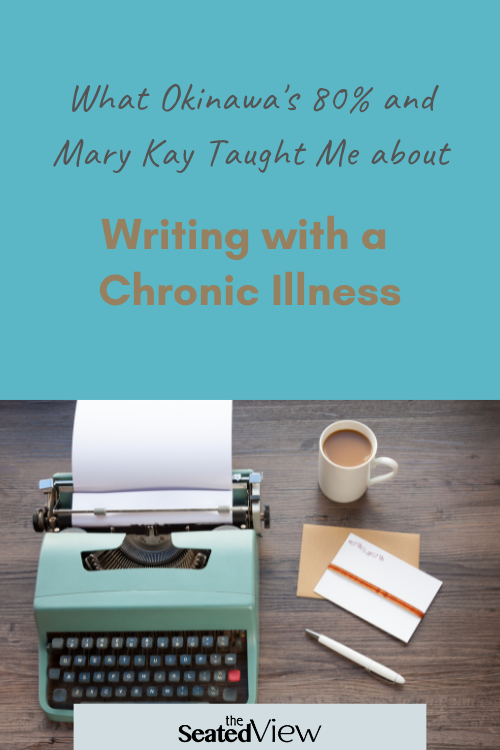What Okinawa’s 80% and Mary Kay Taught Me about Writing with Chronic Illness

Updated September 28, 2021
I ran out of spoons around the middle of June. Then I spent the next six weeks teetering on the line between having just a few and being deep in energy overdraft, while mentally (and repeatedly) chanting just hold on until August 1 and not quite understanding why I was flaring to the tune of more pain than I’ve experienced in a long time. What can I say — I was too busy to think clearly.
I’m still not quite sure how I made it through that.
After a bit more than a week off, I was still hosting a pain party and remained somewhat surprised that I didn’t get better the minute my vacation started. Friends reminded me that it takes time to heal, but I only had three weeks left and would like to be able to do some other things I planned before I have to go back to work.
If reincarnation is real, my task this lifetime is to learn patience. After 50 years, I’m not doing too well.
What I am good at, however, is noticing patterns — this is partly genetic and partly from spending a large part of my life doing jigsaw puzzles with my mother. Over those six weeks of flaring, it became abundantly clear that I need to learn a number of things in order to prevent a complete breakdown. How to manage stress. How to not spend all my energy in my various freelance tasks, instead leaving something left over at the end of the day for me. To understand that other people’s priorities don’t have to become mine. To find time and energy to write, because it makes me a happier person. To have more time for my friends and family bcause that, too, makes me a happier person. To manage my tendency to overcommit and overwork.
When the student is ready, the teacher will appear. Or so they say. And this was true for me, as well. I have had some great conversations in the past few months, as well as having read various things that when put together, helped me figure out the questions. And earlier this month, I found the answers.

A couple weeks ago, I found a wonderful post by Laxmi Hariharan about finding time to write. Specifically, the part about the 80% rule:
“Most of the people on the island of Okinawa in Japan, live to be over 100. Researchers have traced their longevity to a Confucian practice called hara hachi bu that is “eat until you are 80% full.” The result? A longer healthier life.”
Laxmi quotes Justin Jackson’s post about applying the 80% rule to his own life in order to create energy and time to write. “He would deliberately pace himself so that he spent only 80% of his mental energy throughout the day. He explains it as being mindful, to pick 2-3 big things to complete during the day and after that focus on little things which do not need energy. This means he is in for the long haul, without fear of a burn out.”
This doesn’t just work well for finding time to write. This works brilliantly when applied to life with a chronic illness. Can you imagine deliberately not spending all your energy? Can you imagine having 20% left at the end of your workday? I know, right? The very thought makes me all giddy!
After reading Laxmi’s post, I spent about a week kicking the 80% rule around in my head, but also wondering how I’d apply it to myself. Deliberately reining myself in during the day might work for a few days, but I know myself. If something interesting comes up, or things got busy, I knew I would get sucked right back into the crazy.
Hence that bit about learning that other people’s priorities don’t have to become mine.
After a week of chewing on this, the universe apparently decided I was ready for the how. I read Danea Horn’s book Chronic Resilience: 10 Sanity-Saving Strategies for Women Coping with the Stress of Illness and it was life altering. Horn refers to a concept called 6 Things, a time management technique used by Mary Kay (of all people). Every day, she would put the six most important things to do on her list in priority order and when they were done, that was it. If one of the things didn’t get finished, it carried over to the next day, becoming #1 on the list. Which would still be only 6 items.
And the lightbulb went off. This was specific, tangible and doable. This could be applied to The List. I tried it in my last week before my month off. One day, I had 12 things on my list. Even if I cloned myself, it wouldn’t be possible to do all of them. And all of a sudden, I saw that by having more things than were possible to do on my list, all I succeeded in doing was adding constant stress to my days. So, I picked the six most important and ignored the rest. I still worked the same amount of time, but knowing that I was done when I was done made me feel immeasurably lighter.
And that’s how I found a system that will allow me to get stuff done while respecting my chronig illness and not stressing out.
It’s going to take some time to implement. Seeing only six things instead of 15 or 20 will take some doing. Blocking other people’s sense of urgency so I don’t absorb it will be a challenge. But y’know? I think this may have potential for being the tool that gets me to where I need to be.
And for the duration of my vacation, I’m going to try to only do 3 or 4 things a day. Going to the park will be one of them.
3 Comments
Read More
Discover what else I've been writing about...
















I can't tell you how many times I have quoted “The Spoon Theory” to others on the forum I do a lot with. There is no real option for treating our arthritis other than prednisolone and many patients are either scared to death of it or hate it so they try to reduce the dose whilst carrying on with the life they had before they woke up with polymyalgia theumatica – it often strikes overnight! It doesn't work and they must learn the balance of enough drug and the right amount of activity.The alternative is misery.
Me? The most useful quote is: “Dust is patient, very patient – it will always wait!” Cleanliness is important but dusting constantly isn't
That sounds like some good learning Lene. Danae's book sounds well worth reading. I'm going to try the shorter list idea and see if it will work for me.
Read any good books lately? I read Angelmaker which was quite fantastic in a Steam punk/maker sort of way
I totally get this. I call it putting a premium on what I spend my time on. My time is precious, important, and not limitless. I ask myself, how is this going to benefit me; with the emphasis on benefit, and not harm. Great post. I shared it on my page:
https://www.facebook.com/bknwjor